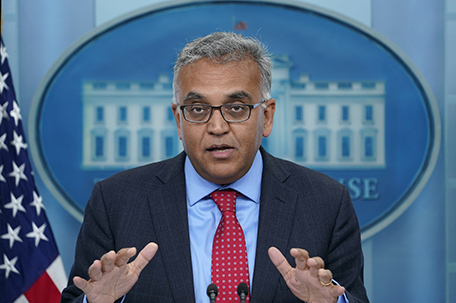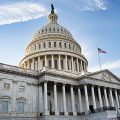
White House COVID-19 Response Coordinator Dr. Ashish Jha speaks during the daily briefing at the White House in Washington, April 26, 2022. The White House is planning for “dire” contingencies that could include rationing supplies of vaccines and treatments this fall if Congress doesn’t approve more money for fighting COVID-19. In public comments and private meetings on Capitol Hill, Jha has painted a dark picture in which the U.S. could be forced to cede many of the advances made against the coronavirus over the last two years and even the most vulnerable could face supply shortages. (AP Photo/Susan Walsh, File)
By Alan Fram
ASSOCIATED PRESS
WASHINGTON — The U.S. is headed for “a lot of unnecessary loss of life,” the Biden administration says, if Congress fails to provide billions more dollars to brace for the pandemic’s next wave. Yet the quest for that money is in limbo, the latest victim of election-year gridlock that’s stalled or killed a host of Democratic priorities.
President Joe Biden’s appeal for funds for vaccines, testing and treatments has hit opposition from Republicans, who’ve fused the fight with the precarious politics of immigration. Congress is in recess, and the next steps are uncertain, despite admonitions from White House COVID-19 coordinator Dr. Ashish Jha of damaging consequences from “every day we wait.”
Administration officials say they’re running low on money to stock up on, or even begin to order, the latest vaccines, tests, and treatments. Also lacking are funds to reimburse doctors treating uninsured patients and to help poor countries control the pandemic.
House and Senate Democrats have been wrangling over how to resolve the stalemate and even over which chamber should vote first. It’s an open question whether they’ll ever get the GOP votes they’ll need to pull the legislation through the 50-50 Senate, and prospects in the narrowly divided House are unclear as well.
“There is still an urgency to pass a COVID relief package,” Senate Majority Leader Chuck Schumer (D-N.Y.) said last week. “It’s very, very much needed.”
Optimists hope the measure could start rolling once Congress returns next week. Pessimists say without quick resolution, Democrats may not have enough leverage to push the money to passage until early fall. That’s when they could stuff it into legislation that will probably be needed to finance the government — a bill that would avert a federal shutdown, a pre-election distraction Republicans will be desperate to avoid.
The heap of sidelined Democratic initiatives has grown this year, a victim of GOP opposition and rebellions by centrists like Sen. Joe Manchin (D-W.Va.). Casualties include bills on voting rights, health care, environment, taxes, gun curbs, abortion rights, policing tactics, and an investigation of the 2021 Capitol storming by then-President Donald Trump’s supporters.
While lawmakers have approved massive packages financing federal agencies through September and helping Ukraine counter Russia’s invasion, other priorities are dead or drifting, even as Democrats’ days running Congress are likely dwindling. Republicans are favored to win House control in November’s elections and could grab the Senate as well, and Democrats’ frustration is clear.
“So far it hasn’t moved,” Sen. Mazie Hirono (D-Hawaii) said of Biden’s latest $22.5 billion request for COVID-19, which he initially sent Congress three months ago. “But then neither has sensible gun legislation, neither has voting rights.”
“The 50-50 Senate sucks,” she said.
The COVID money is needed quickly, officials say. Their warnings have come with over 1 million U.S. deaths from the disease and a fresh variant that daily is hospitalizing over 100,000 Americans and killing more than 300. Both numbers are rising.
Officials say that lacking fresh funds, the U.S. is falling behind other countries that are already lining up for supplies needed for fall and winter. That’s prompted Jha to plan for the chance that Congress provides no new money at all, threatening painful choices about what to do if there aren’t enough vaccines or therapeutics for all who need them.
“It would be terrible,” Jha told reporters recently. “I think we would see a lot of unnecessary loss of life if that were to happen.”
Congress has provided $370 billion for purchasing supplies, for research and other public health initiatives to combat the pandemic, according to administration tallies obtained by The Associated Press. Around $14 billion of it was unspent or not committed to contracts as of April 5, the documents show, serious money but an amount the administration says falls below the ultimate need.
Most Republicans are skeptical about added pandemic funding. “I have a hard time believing that there’s not enough money and not enough flexibility already” to use it, said Sen. Kevin Cramer (R-N.D.).
Counterintuitively but unsurprisingly for the always perplexing Senate, one intractable puzzle stymying Democrats is immigration.
Senate Republicans are demanding a vote amending the pandemic legislation with language retaining Trump-era curbs that, citing COVID-19, have made it easier to bar migrants from entering the U.S.
A federal judge has blocked Biden from ending those restrictions. Liberals want Congress to eliminate the clampdown, but moderate Democrats in both chambers facing tough reelections want to vote to retain it.
The result: Testy divisions between the Democrats’ two ideological factions, and knotty questions for party leaders about how to resolve them and push a pandemic package to passage.
Their task is compounded by disputes between House and Senate Democrats over why the COVID-19 battle remains unresolved.
Senate Democrats note a bipartisan $15.6 billion pandemic compromise was on the cusp of House passage in March until that chamber’s progressive Democrats rebelled against spending cuts to pay for it, derailing the money. “We’re waiting for the House to send us something,” Schumer said.
House Democrats say even if they do, the biggest hurdle will still be the Senate, where 10 GOP votes will be required to reach that chamber’s usual 60-vote threshold for passage. They note that an April deal between Schumer and Sen. Mitt Romney (R-Utah) for $10 billion in COVID-19 money collapsed after Republicans demanded the immigration vote.
“We want to get COVID-19 done, but the only impediment right now is the United States Senate,” House Majority Leader Steny Hoyer (D-Md.) told reporters recently.
That’s left Republicans waiting for Democrats’ next move.
“I would imagine at this point way over half of our members will vote against this, no matter what. So, the question is what do you do to get it acceptable to 10 or 12” Republican senators, said Sen. Roy Blunt of Missouri, a member of GOP leadership. “And I don’t know.”
















Leave a Comment